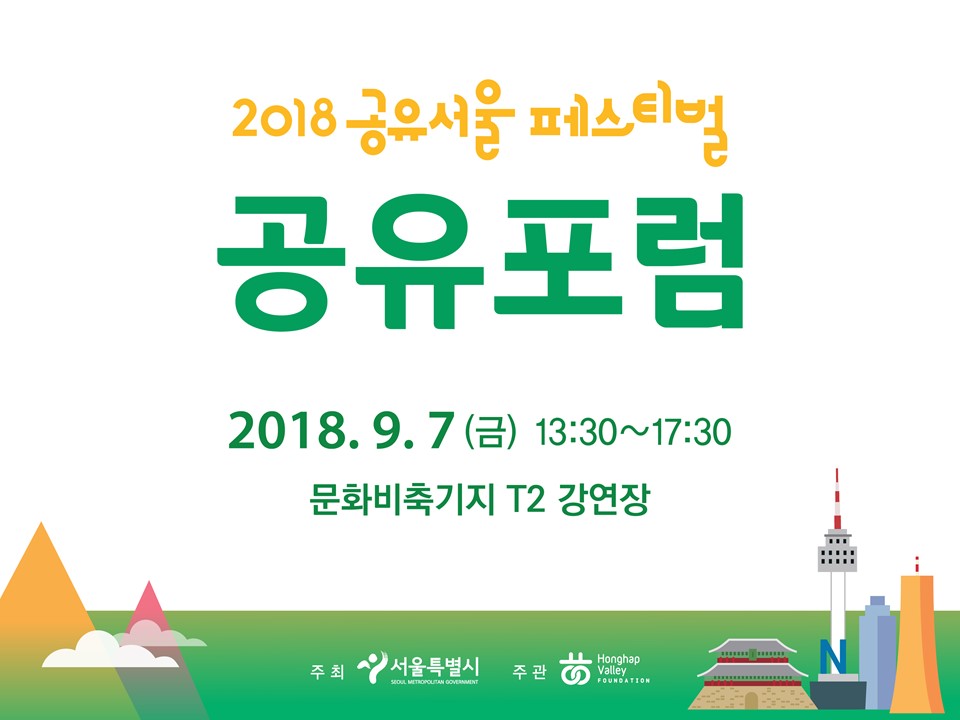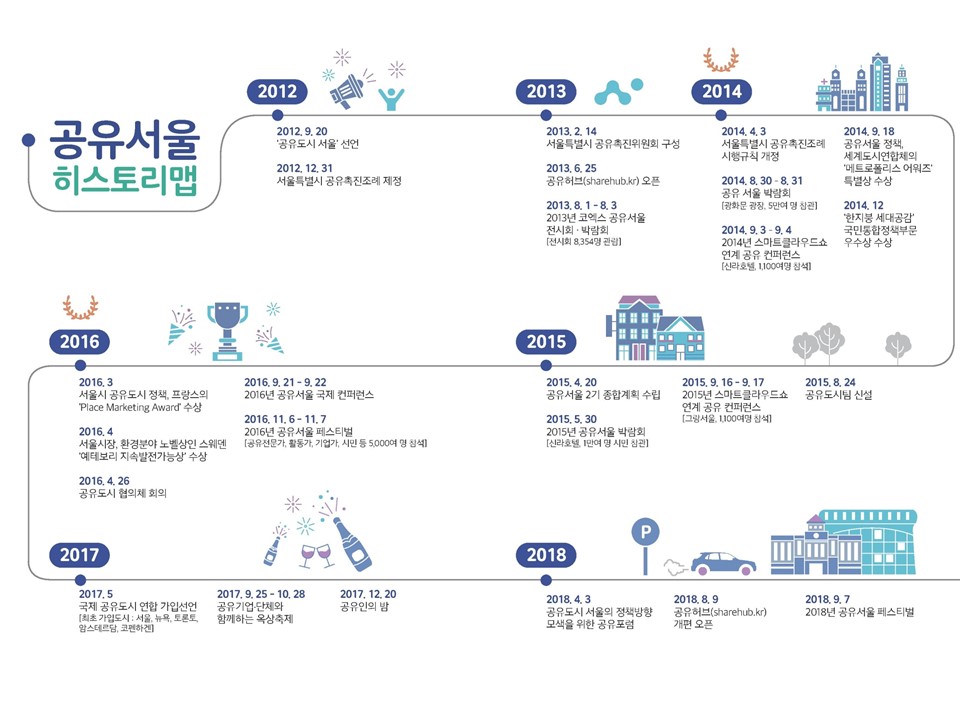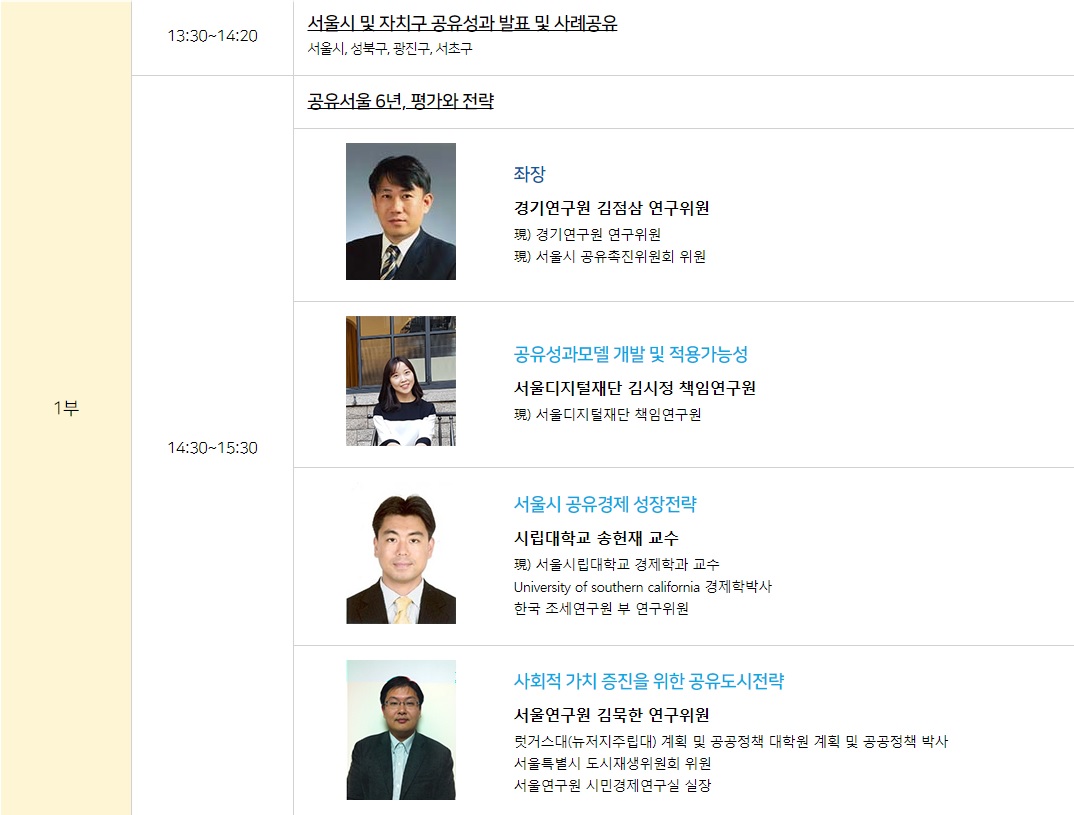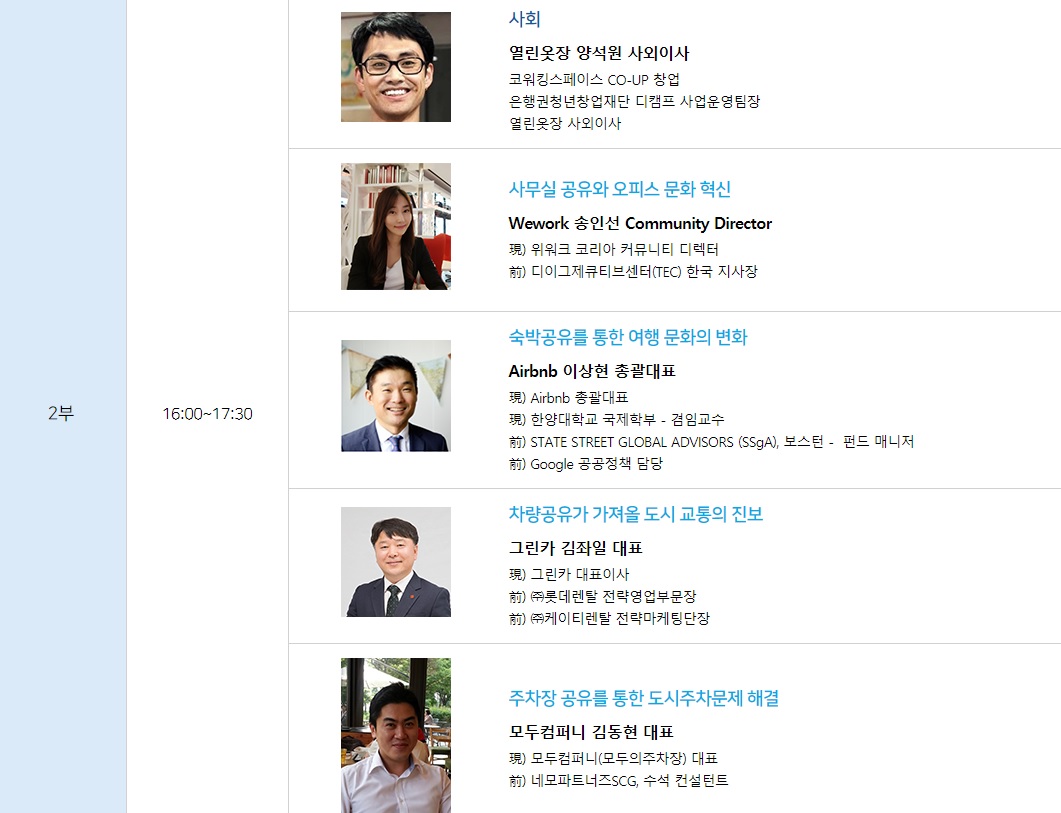List
Story > NEWS > Detail
"Open Seoul Sharing Forum - Seoul's theme on the Sharing"

On September 7, the Seoul Sharing forum was held at the '2018 Share-Seoul Festival' event at the Cultural Heritage in Mapo district, Seoul. The sharing forum was largely divided into first and second sections. Part 1 took time to announce the shared performances of the Seoul Metropolitan Government and the autonomous districts and helpful sharing-policy examples with each other. And In the name of "Share-Seoul, six years of evaluation and strategy," the analysis of a shared economy expert could be heard. Part 2 received opinions from experts at domestic and abroad on the city's shared policies, and was able to take time to learn about the global trend in the shared economy.

The first presentation of the first part was made by the Seoul Metropolitan Government, which gave an overview of the current state of public policy implementation in Seoul by Lim Kook-hyun. From understanding the concept of shared economy and sharing to the basic tasks of the Seoul Metropolitan team, the announcement was made on the progress of the Seoul Sharing Policy, which has been underway since 2012. In Seoul, a total of 85 shared projects are carried out in 25 municipalities, and the government is pursuing a shared policy by the Seoul Metropolitan Government, including joining the International Federation of Shared Cities. The second peak was announced by Lim Jeong-sun, the head of the community economy and social economy team, on the status of the project to build a shared apartment in Seongbuk district. It was able to announce its future plans while emphasizing the need for shared apartments and the shared economy project that embodies the characteristics of Seongbuk district. The third peak was followed by the announcement of a shared case in Gwangjin district. The announcement by Kim Sam-ju, the head of the municipal administration in Gwangjin district, introduced a variety of shared economic policies, including the "one roof two generations". Gwangjin district was selected as the best district from 2015 to 2017 for the incentive project to promote sharing. The fourth peak was the announcement of parking management and Lee Jung-woo in Seocho district.

The first round of expert sessions was announced by Kim Si-jung, a senior researcher at the Seoul Digital Foundation. Under the theme of 'Shared City Performance Model and Applicability', Kim Si-jung, a senior researcher, explained that the city's shared city types were divided into 'Business,' 'social relations' and 'Resource Utilization'. Seoul, a shared city aimed at by the Seoul Metropolitan Government, evaluated that it is "happy citizens, sustainable cities that are being built into a shared city". Song Hyun-jae, a professor of University of Seoul, compared Seoul City's shared policies and institutions under the theme 'Seoul Shared Economy Growth Strategy' and emphasized the need to improve laws and institutions. Song claims that the concept of a shared economy is not unfamiliar to the people, but it can also be found in traditional virtues such as ‘Pumasi(품앗이)’ and ‘Du-re(두레)’, and also in the 'Anabada' movement that took place after the IMF financial crisis. The shared economy of the present day is also analyzed to have an explosive ripple effect by combining IT based on the internet with the benefit of sharing. As mentioned earlier, Professor Song mentioned at the end of the announcement the need to improve laws and institutions in order to stimulate the shared economy, which was a request for fairness as there were many shared economies through the platform. It stressed the need to distinguish between common transactions and professional commercial practices in order to introduce a proper taxation system and the establishment of a shared economic environment in which fair competition can be made between existing operators.
Kim Muk-han, a researcher at the Seoul Institute, explained the two direction that the importance of cities and the types and evolution of 'shared goods', and in the name of "shared city strategy for promoting social values." The two directions provided a discussion that it was important to orientate the use of 'smart' or ICT, or to expand and reproduce urban common materials. Kim Mook-han, a researcher, argued, "The shared economy does not only take place within a framework, but can try various experiments and find out the possibility of developing another shared economy." Therefore, Seoul like the city government does not to seek a particular 'general solution' but to find a 'special answer' but to play a role in keeping it a unique meaning.

In Part 2, it was time to analyse the cases in which shared cities were actually applied. The shared economy policy enabled citizens to gain access to the utility they felt in a shared city. The second part was carried out by Yang Seok-won, an outside director of an “open wardrobe”. The first speaker was Song In-sun, community director of WEWORK, who made the announcement under the theme 'Office sharing and innovation in office culture.' It was time to explain the value of the shared office that WEWORK was aiming for. Airbnb's policy chief Lee Sang-hyun made a presentation on the history of Airbnb and the legal and institutional problems in Korea. The third speaker was Greencar CEO Kim Jwa-il, under the theme of 'The Evolution of Urban Transportation by Vehicle Sharing,' and the fourth speaker, Kim Dong-hyun, chairman of the "Parking Lot for everyone" was announced.
A citizen who participated in the event left behind the reviews of the public forum.
"While we often use 'Seoul Bike' when we live in Seoul, we didn't know actuaill shared economy. Hopefully, the shared policy that can make our lives more valuable and comfortable will be applied in more diverse ways, making the name 'Share-Seoul' even more proud."
“I am a young man who is preparing for a shared company in Seoul. I feel ashamed of myself for having vague understanding of the shared economy. I thought that I wanted to have a business that was not just for profit, but for a business that could be shared to help a wider variety of stakeholders. In addition, I was pleased to learn that not only the city of Seoul but also the municipalities also have various programs to support the shared economy. If I have a chance to use it, I would like to use it. In addition, I will often visit the "Shared Hub" homepage to learn new information and study the shared economy."
About 150 people attended the event and showed off their seats. Next year's shared forum will allow stakeholders from a wider variety of shared economies to present better shared economic issues, as well as expose new shared companies' growth.
On September 7, the Seoul Sharing forum was held at the '2018 Share-Seoul Festival' event at the Cultural Heritage in Mapo district, Seoul. The sharing forum was largely divided into first and second sections. Part 1 took time to announce the shared performances of the Seoul Metropolitan Government and the autonomous districts and helpful sharing-policy examples with each other. And In the name of "Share-Seoul, six years of evaluation and strategy," the analysis of a shared economy expert could be heard. Part 2 received opinions from experts at domestic and abroad on the city's shared policies, and was able to take time to learn about the global trend in the shared economy.
The first presentation of the first part was made by the Seoul Metropolitan Government, which gave an overview of the current state of public policy implementation in Seoul by Lim Kook-hyun. From understanding the concept of shared economy and sharing to the basic tasks of the Seoul Metropolitan team, the announcement was made on the progress of the Seoul Sharing Policy, which has been underway since 2012. In Seoul, a total of 85 shared projects are carried out in 25 municipalities, and the government is pursuing a shared policy by the Seoul Metropolitan Government, including joining the International Federation of Shared Cities. The second peak was announced by Lim Jeong-sun, the head of the community economy and social economy team, on the status of the project to build a shared apartment in Seongbuk district. It was able to announce its future plans while emphasizing the need for shared apartments and the shared economy project that embodies the characteristics of Seongbuk district. The third peak was followed by the announcement of a shared case in Gwangjin district. The announcement by Kim Sam-ju, the head of the municipal administration in Gwangjin district, introduced a variety of shared economic policies, including the "one roof two generations". Gwangjin district was selected as the best district from 2015 to 2017 for the incentive project to promote sharing. The fourth peak was the announcement of parking management and Lee Jung-woo in Seocho district.

The first round of expert sessions was announced by Kim Si-jung, a senior researcher at the Seoul Digital Foundation. Under the theme of 'Shared City Performance Model and Applicability', Kim Si-jung, a senior researcher, explained that the city's shared city types were divided into 'Business,' 'social relations' and 'Resource Utilization'. Seoul, a shared city aimed at by the Seoul Metropolitan Government, evaluated that it is "happy citizens, sustainable cities that are being built into a shared city". Song Hyun-jae, a professor of University of Seoul, compared Seoul City's shared policies and institutions under the theme 'Seoul Shared Economy Growth Strategy' and emphasized the need to improve laws and institutions. Song claims that the concept of a shared economy is not unfamiliar to the people, but it can also be found in traditional virtues such as ‘Pumasi(품앗이)’ and ‘Du-re(두레)’, and also in the 'Anabada' movement that took place after the IMF financial crisis. The shared economy of the present day is also analyzed to have an explosive ripple effect by combining IT based on the internet with the benefit of sharing. As mentioned earlier, Professor Song mentioned at the end of the announcement the need to improve laws and institutions in order to stimulate the shared economy, which was a request for fairness as there were many shared economies through the platform. It stressed the need to distinguish between common transactions and professional commercial practices in order to introduce a proper taxation system and the establishment of a shared economic environment in which fair competition can be made between existing operators.
Kim Muk-han, a researcher at the Seoul Institute, explained the two direction that the importance of cities and the types and evolution of 'shared goods', and in the name of "shared city strategy for promoting social values." The two directions provided a discussion that it was important to orientate the use of 'smart' or ICT, or to expand and reproduce urban common materials. Kim Mook-han, a researcher, argued, "The shared economy does not only take place within a framework, but can try various experiments and find out the possibility of developing another shared economy." Therefore, Seoul like the city government does not to seek a particular 'general solution' but to find a 'special answer' but to play a role in keeping it a unique meaning.

In Part 2, it was time to analyse the cases in which shared cities were actually applied. The shared economy policy enabled citizens to gain access to the utility they felt in a shared city. The second part was carried out by Yang Seok-won, an outside director of an “open wardrobe”. The first speaker was Song In-sun, community director of WEWORK, who made the announcement under the theme 'Office sharing and innovation in office culture.' It was time to explain the value of the shared office that WEWORK was aiming for. Airbnb's policy chief Lee Sang-hyun made a presentation on the history of Airbnb and the legal and institutional problems in Korea. The third speaker was Greencar CEO Kim Jwa-il, under the theme of 'The Evolution of Urban Transportation by Vehicle Sharing,' and the fourth speaker, Kim Dong-hyun, chairman of the "Parking Lot for everyone" was announced.
A citizen who participated in the event left behind the reviews of the public forum.
"While we often use 'Seoul Bike' when we live in Seoul, we didn't know actuaill shared economy. Hopefully, the shared policy that can make our lives more valuable and comfortable will be applied in more diverse ways, making the name 'Share-Seoul' even more proud."
“I am a young man who is preparing for a shared company in Seoul. I feel ashamed of myself for having vague understanding of the shared economy. I thought that I wanted to have a business that was not just for profit, but for a business that could be shared to help a wider variety of stakeholders. In addition, I was pleased to learn that not only the city of Seoul but also the municipalities also have various programs to support the shared economy. If I have a chance to use it, I would like to use it. In addition, I will often visit the "Shared Hub" homepage to learn new information and study the shared economy."
About 150 people attended the event and showed off their seats. Next year's shared forum will allow stakeholders from a wider variety of shared economies to present better shared economic issues, as well as expose new shared companies' growth.



